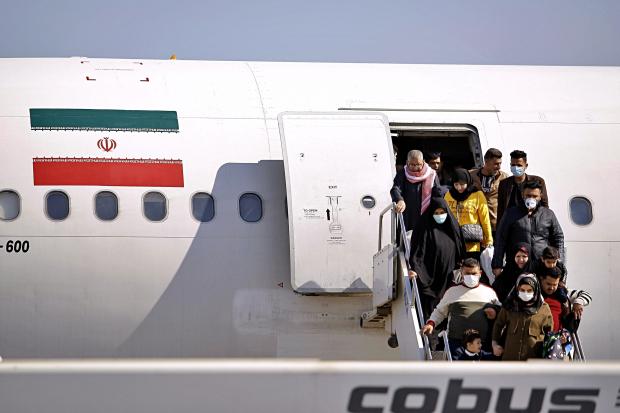Iran’s health ministry raises death toll from new virus to 8

Passengers disembarking from an Iranian plane in the airport in Najaf, Iraq, Friday, Feb. 21, 2020. Iraqi authorities are taking precautions at Najaf and other Iraqi airports, as well as at the border gates with Iran, after the discovery of the new virus that emerged in China in Iran. (Photo by ANMAR KHALIL / AP)
TEHRAN, Iran — Iran’s health ministry raised Sunday the death toll from the new virus to eight people in the Middle Eastern country, amid concerns that clusters there, as well as in Italy and South Korea, could signal a serious new stage in its global spread.
Health ministry spokesman Kianoush Jahanpour told state TV that there were now 43 confirmed cases of the illness in Iran.
The outbreak in Iran has centered on the holy city of Qom, where officials say travelers from China brought the new coronavirus.
Iran reported its first case of the virus last Wednesday.
Jahanpour added that the 15 newly confirmed cases included 7 in Qom, four in the capital, Tehran, two in the northern Gilan province, one in the central Markazi province, and one from town of Tonekabon in the northern Mazandaran province, who died of the illness.
Earlier on Sunday, Iran’s health minister acknowledged that travel from China brought the new virus to the country.
Article continues after this advertisementSaeed Namaki told state TV that the virus came from China to the holy city of Qom in central Iran. He said that one Iranian dead from the virus was a merchant who regularly shuttled between the two countries using indirect flights in recent weeks after Iran stopped direct passenger flights to China.
Article continues after this advertisementNamaki also defended the government’s handling of the outbreak, saying it was being “transparent.” He said it would help make face-masks and sanitizers available for Iranians, amid concerns that stocks were running low in the capital’s pharmacies.
Iran is also producing kits for diagnosis of the infection, he added.
Namaki urged people not to visit Qom, which is a major destination for Shiite pilgrims.
“We obviously do not recommend traveling to Qom and other pilgrimage cities,” Namaki said.
The government has closed down schools and religious seminaries in the holy city of Qom, where the virus first killed two elderly patients last week. Schools in Tehran and four other cities were closed as well, starting Sunday for two days.
Iran has also set up 36 screening stations at different ports of entry to the country to check for possibly infected travelers, he added.
Iraq and Pakistan, which share borders with Iran, have already taken preventive measures to limit the spread of the virus from Iranian travelers.
Officials in the Pakistani province of Baluchistan, which shares a long frontier with Iran, have declared an emergency as they seek to stop the spread of the virus via the Taftan border crossing with Iran.
Infected travelers from Iran already have been discovered in Lebanon and Canada.
Lebanon’s first case of the new virus was discovered on a flight from the Iranian city of Qom this week.
Saudi Arabia has ordered anyone traveling from Iran to wait at least 14 days before entering the kingdom as it seeks to prevent the spread of the virus to the Muslim pilgrimage sites of Mecca and Medina.
/atm
For more news about the novel coronavirus click here.
What you need to know about Coronavirus.
For more information on COVID-19, call the DOH Hotline: (02) 86517800 local 1149/1150.
The Inquirer Foundation supports our healthcare frontliners and is still accepting cash donations to be deposited at Banco de Oro (BDO) current account #007960018860 or donate through PayMaya using this link.